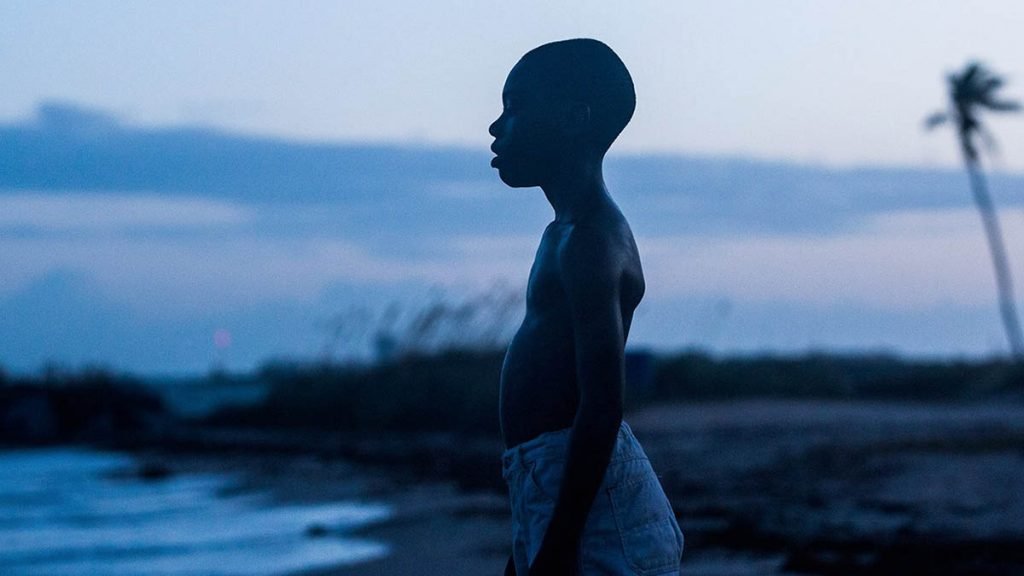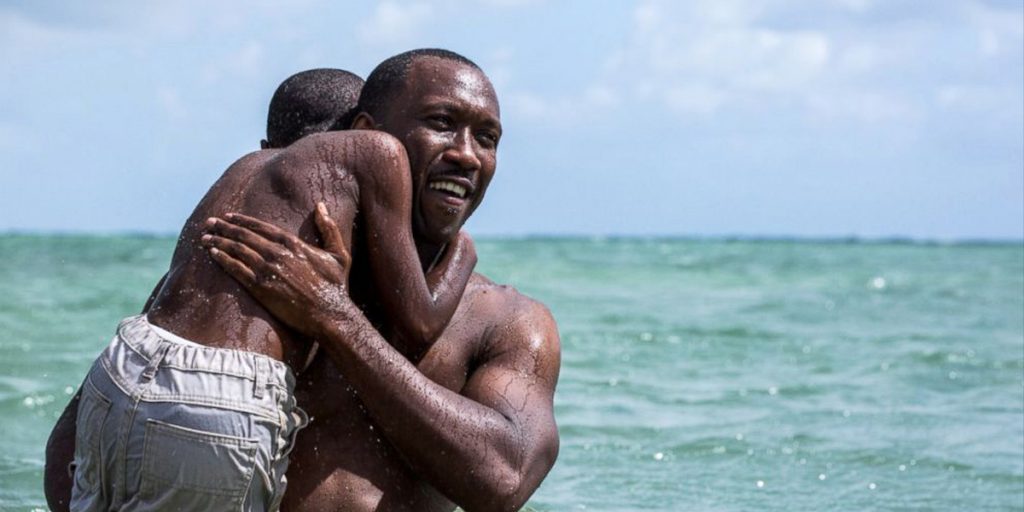With Moonlight, Barry Jenkins creates a modern-day classic with his breathtaking portrayal of an African American gay man who comes-of-age in a fractured society.
Adapted from Tarell Alvin McCraney’s play ‘In Moonlight Black Boys Look Blue,’ Barry Jenkins’ Moonlight tells the story of a queer, African American boy. Moonlight is split into three episodic parts centred around the defining points of a young man’s life. Known as Little/Chirone/Black (played by Alex Hibbert, Ashton Sanders and Trevante Rhodes, respectively), his different names may reflect Chirone’s desire to reinvent himself at every turn. However, from child to adult, each actor so eloquently characterises Chirone as a lost and confused young man who suffers from the hyper-masculinised society of 1980s Miami. Winner of the Academy Award for Best Picture in 2017, Moonlight concerns itself with themes of self-discovery, isolation, and freedom, shown through the interweaving tapestry of unexpected friendship and poignant symbolism.
Moonlight begins with head trapper Juan (Mahershala Ali) parking up in a Miami backstreet to check up on one of his drug dealers. In this brief interaction, Jenkins so effectively builds the world in which his characters exist. Society is rife with crime and drugs are the only currency. It seems fitting, then, that when Juan shuts off his engine, killing the voice of Jamaican singer, songwriter Boris Gardiner, the sound of police sirens in the distance can be heard. Although Moonlight has a broad, and at times captivating soundtrack, it is these sirens that are the true backing track to Moonlight’s 1980s Miami.
Main character Chirone, known here in act one as Little, explodes onto the screen in a flurry of fear and panic. It is only when the young boy seeks refuge in an abandoned house that we can become acquainted with Moonlight’s protagonist. Soon enough, Juan tears down the makeshift window and steps into the apartment, breaking down both the physical and symbolic barrier between them. From this very first interaction between the two, Moonlight presents itself as a film determined to do just that: tear down the walls a history of preconceived misconceptions has built. As Juan takes Little for food and provides him with a haven to escape to when needed, Jenkins tells the tale of tenderness. With Jenkins’ portrayal of this lost boy and the drug dealer who found him, he doesn’t just humanise black men, but says they have been human all along.

Jenkins’ portrayal of queer blackness is refreshing, and even six years on, we can look back on its exploration as one of the most respectful and honest representations of this minority to date. Throughout Moonlight, Chirone’s sexual desires appear to pulse cautiously beneath the surface as he tries to balance this internal battle with the wrath of his drug-addicted mother. The same subtly is shown when Chirone’s desires are finally given space to breathe. His first sexual encounter is shown in a non-exploitative way, preventing it from being fetishized. This pivotal moment is viewed by the audience from behind and at a distance, giving the impression that for the first time in his life, Chirone has something that is completely, and solely, his. It seems fitting that this event takes place in front of the ocean, where Juan taught him how to swim when he was a child. As six-year-old Little floats in Juan’s arms earlier in the film, he learns for the first time in his life to let go. At sixteen, sat on the sand with his friend Kevin (Jharrel Jerome), swapping a tender embrace, Chirone finds the freedom that this letting go allows.
This heart wrenching story is carried by an outstanding ensemble cast, with the most impressive multi-actor protagonist in recent years. Hibbert, Sanders and Rhodes transcend their similarity in physical likeness by their ability to show Chirone as a fearful, fiercely strong, and isolated character no matter his age. At the end of Moonlight, one feels like they have watched Chirone grow from a child into a man, like that of Richard Linklater’s Boyhood (2014), where the director filmed Ellar Coltrane as Mason for a period of 12 years during his coming-of-age. These deeply emotional, fiercely strong performances from these three actors are accompanied by an equally as strong supporting cast. Mahershala Ali, who won Best Performance by an Actor in a Supporting Role at the 2017 Academy Awards for his work as Juan, is staggering as he only appears in a third of the film’s runtime. This is deserved, however, as despite Ali’s limited screen time, his presence seems to loom, and surfaces once again in the third section through the way Black carries himself and the values he upholds.
With its stunning cinematography, unforgettable performances and poignant storyline, Moonlight’s masterclass in filmmaking makes it a modern-day classic. It is a bucket list watch until it’s a go-to re-watch anytime you want to feel how powerful cinema can really be.
Moonlight is now available to watch on digital and on demand.

